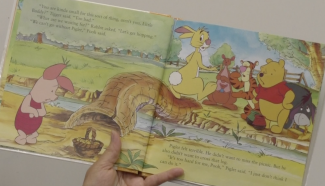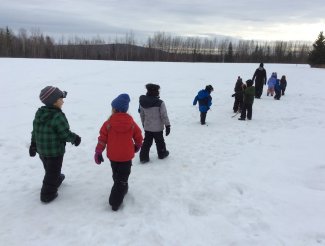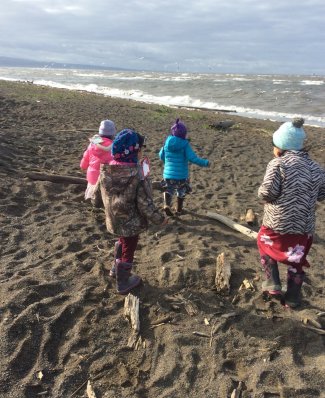Cohort 1: Non-rural Children

Fall 2018/Spring 2019
Equipping children to navigate off-trail in the forest across fallen tree logs. During the first visit to the Boreal Forest in Fall 2018, the children explored off trail in the boreal forest. Some of the children became nervous and scared in crossing over fallen logs. Children pushed other children in an anxious response to uncertain conditions. Thus, the focus of the lesson was on encouraging children to give each other space and take courage in navigating difficult situations in nature. The children’s teacher read a Winnie the Pooh book titled “Believe in Yourself” and instigated a lesson in which children balanced over a balance beam.
Safety on the Snow. Snow, ice, and slushy conditions characterized children’s visit to Creamer’s field in March. This made it challenging to identify where it was safe to step and where it was not. Unequipped to discern, some children wandered into wetland and pond areas that were potentially dangerous. The ice had begun to melt, and these areas were no longer thoroughly frozen. The teacher and research team collaborated in developing a lesson promoting children’s environmental competency of safety on ice and snow.
Where should we go and where should we not go?

David - “Safe at bus. Not safe at the water–like seawater (not puddles). I seen water there so I know it is there–the first time I went to Creamer’s field.”
Amanda - “Can go in the bridge. You can go on snow. You can go in the forest. Can’t go on the lake. Can’t go in the fox den.”
Joseph - “Safe on the bridge can walk on wood. Not safe in the water. Next time I go to Creamer’s field I will bring my fishing pole so I can tell it is deep or shallow on the lake.”
Sarah - “Can go on the bridge. Can’t go on the water. Can’t go in the lake.”
Justin - “I could go all the places except for the sea.”
Brittany - “Safe in the woods. Not safe on the lake.”-
Robert - “Not on ice where water is. Stay where there is snow.”
Joshua - “You can only go on the log, but you can’t fall off the log backward.”
Andrew - “There me are./da me dot.”
Samantha - “Can go with sticks. We can’t go on the water.”
Christopher - “Can go on the bridge. Can’t go in the forest.”
Jessica - “Can go explore places in the puddles and have fun and splash. Can’t go where I can’t go is on the lake because it might not be thick and I would fall in and I would be scared.”
Stephanie - “Go on the sidewalk with no snow. Can’t go into the forest.”
Cohort 2: Rural Children
Fall 2019
Safety at the Beach. For the first outing of Fall 2019, the children visited the beach near their school. It was a windy day, and sizable waves were crashing on the shore. Some children approached the water, and one even climbed onto a driftwood log that was being battered by waves. We facilitated a reflective question and discussion about safety, to encourage children to think about and share safe behaviors. Afterwards, the children's bicultural teacher incorporated the topic of ocean safety into a language lesson.

The Ocean- How can we be safe at the beach?
Anne - “Not hit people with sticks.”
Philip - “Gun. Swimming.”
Owen - “Stay away from the water.”
Oliver - “I don’t know.”
Samuel - “Be at my house.” Researcher - Can you go by yourself? “No.”
Jackson - “Lost the sticks in the water.”
Emma - “I always run away from the water when I try to look for little fish.”
Patrick - “We can go home.”
Sally - “Run away from the waves.”
David - “I like to play at the playground by the beach.” “Don’t go by myself.”
Chloe - “Water.” “Choo choo train.”
Erin - “Do not go in the water!”
Grace - “When my dad comes to get me and we go home. Have cocoa and marshmallows.”
Steven - “Throwing sticks at the waves.”
Ocean Safety in Iñupiaq. The bicultural teacher continued the ocean safety discussion in her lesson. She taught the Inupiaq terms for different ocean conditions, either smooth or rough. She encouraged the children to use their own observation skills to read and understand the ocean.
This project is funded by the National Science Foundation. Award # 1753399, CAREER: A longitudinal study of the emotional and behavioral processes of Environmental Identity Development among rural and non-rural Alaskan children

